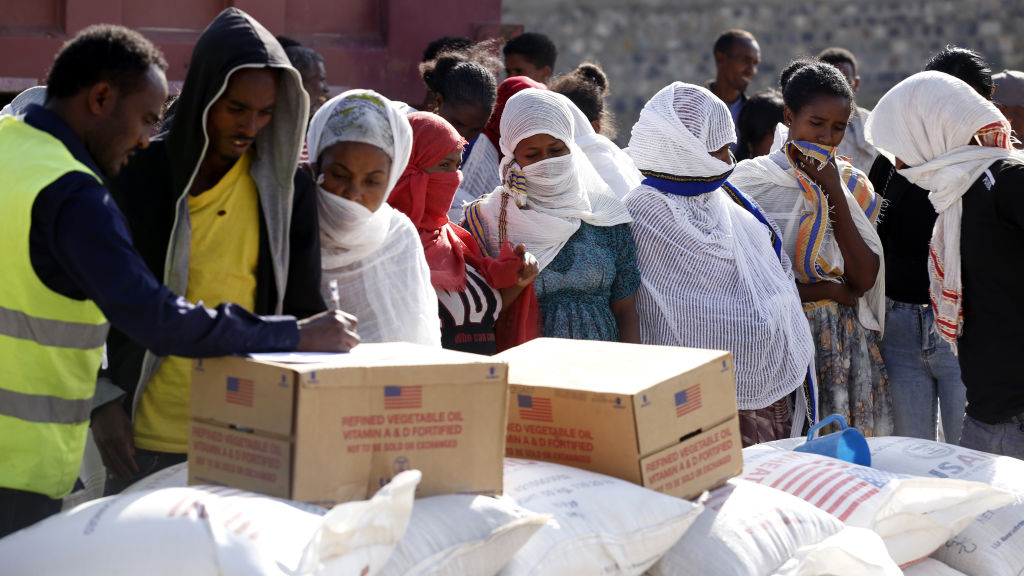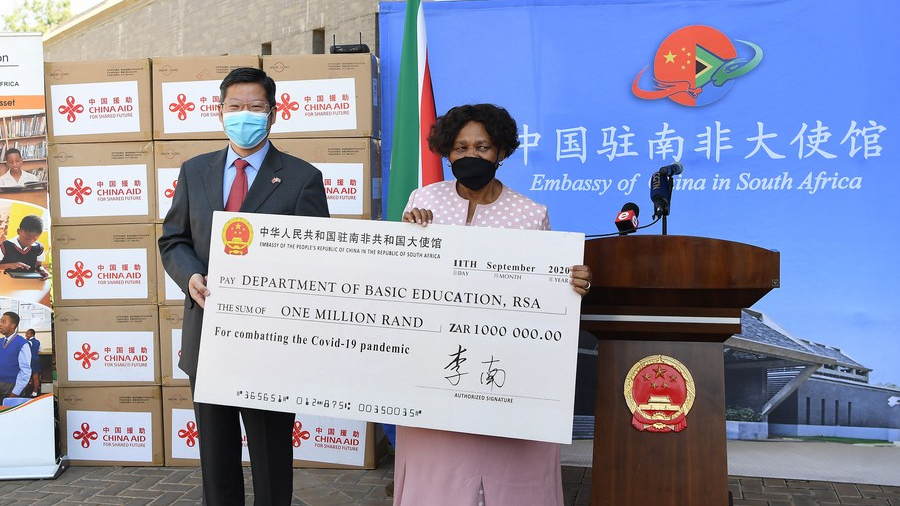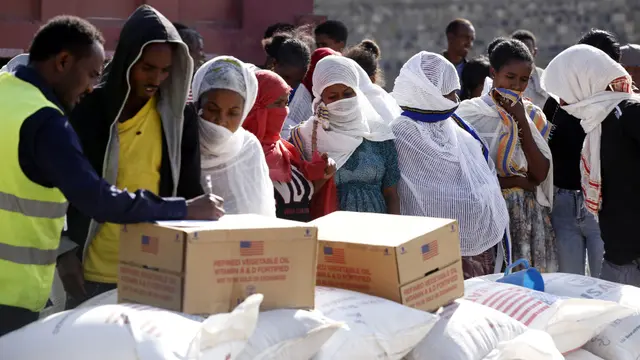
Tigray people, who fled due to conflicts and are taking shelter in Mekelle city of the Tigray region, in northern Ethiopia, receive food aid distributed by the United States Agency for International Development, March 8, 2021. /Getty
Editor's note: Azhar Azam works in a private organization as market and business analyst and writes about geopolitical issues and regional conflicts. The article reflects the author's opinions and not necessarily the views of CGTN.
Africa's importance for being the home of more than half of the world's fastest growing economies and two-thirds of the Earth's arable land alongside the continent's untapped strategic materials was always enormous. Realizing these advantages, U.S. officials are abruptly advising their government not to ignore or underestimate the economic opportunity and strategic consequence of Africa.
Following the Suez Canal obstruction, the strategic choke points in the region have become waterways of special significance for Washington over their role in facilitating one-third each of shipping between North America and Asia and global oil trade. American security now depends on "unhindered access to these waters" as the U.S. African Command (AFRICOM) wants to use sea lines of communication to engage the continent.
The impoverished continent is one of the few areas where China and the U.S. can cooperate but when American officials wrongly disseminate China's base in Djibouti as its first overseas military outpost, it rings alarm bells. While the Chinese support base or logistics facility was opened in 2017 to assist peacekeeping and humanitarian efforts and anti-piracy escort missions in the Gulf of Aden and waters off Somalia – it was France, Japan and the U.S. that before China had already established military installations there.
Compared to China's only base in Africa, the U.S. between 2001 and 2020 had built a sprawling network of military outposts in more than a dozen African countries. The so-called "light and relatively low-cost footprint" comprising a constellation of 29 U.S. military bases in the continent debunked the claim that the U.S. never wanted to be a colonizing or dominant power in Africa.
In fact, the most extensive and permanent U.S. military base, Camp Lemonnier, is located in Djibouti where the U.S. special forces, fighter planes and helicopters are deployed under AFRICOM's Combined Joint Task Force-Horn of Africa program. It is also a key U.S. base for conducting drone operations in Somalia and Yemen.
The establishment of AFRICOM in 2007 was itself controversial as people and governments in Africa feared a hidden U.S. agenda behind its creation. Termed as "militarization" of America's foreign policy, its formation was driven by U.S. imperious ambitions rather than meeting development needs of the continent.
The "long game" U.S. officials accuse Beijing of in the continent is a longstanding relationship between Africa and China that has been beefed up by decades of mutual understanding, bilateral respect and trust in each other. With more embassies than the U.S. and nonpareil investments, infrastructure and development spending – China doesn't need to set up military bases to be Africa's preferred partner.
Some argue that U.S. President Joe Biden's Africa policy will focus on building America's soft power in the continent through news and entertainment industries since 24 African countries use English as their official language. While Washington always had this edge, ever-growing Afro-Sino ties are testament that cultural exchanges, not cultural influence or linguistic advantage, are vital to gain moral high ground in bilateral relationships.
Although there are some areas of cooperation between China and the U.S. in Africa from security, economy to public health – until and unless the U.S. stops discrediting the Afro-Sino intimate fondness for one another and making Africa an additional battleground to outpace Beijing globally, any collaboration won't contribute toward achieving shared goals and peace and stability in the continent.

Li Nan, Charge d'Affaires of the Chinese Embassy, hands over the donation to the Minister of Basic Education Angie Motshekga in Pretoria, South Africa, September 11, 2020. /Xinhua
China's engagement in Africa could be classified as constructive, for it is Africa's largest trading partner and has been financing and constructing one in five and three projects in the continent respectively. Aches of the Cold War and development and trade benefits with China are the other major factors, which would enthuse the African governments to protect their economic and security interests by resisting the U.S. pressure on China.
From tart response on rooting out Huawei gears to voicing support for China on alleged human rights in Xinjiang Uygur Autonomous Region and security law in Hong Kong Special Administrative Region, African nations have repeatedly communicated that they oppose disrupting the international harmony by trying to target a specific country on baseless allegations for vested interests of some states.
There has been a growing realization in the developed world that China's "debt trap" – a branding that irks several countries including African nations – is a myth as Chinese companies have learned to compete in the international construction business over the last 20 years and Beijing's diplomacy relies on consensus, sophistication and shared growth, which would be "a shame" if the U.S. fails to learn.
According to the World Health Organization Regional Office for Africa, out of 690 million COVID-19 doses administered globally as of earlier this month, only less than 2 percent of Africans have received the jabs, with 93 percent of shots given in 10 countries. By hoarding more-than-required vaccine, the "me first" Western attitude is risking millions of lives in Africa and threatens to prolong Africans' ordeal.
Blaming rich countries of perpetrating "vaccine apartheid," infuriated African nations are calling out vaccine-producing countries to stop practicing vaccine nationalism. As the health crisis in India halts vaccine supply to Africa, the U.S. has ingloriously turned to its Defense Production Act banning exports of vaccine raw materials and is bizarrely telling global nations that it was in their interest to see Americans vaccinated.
Despite a huge task to vaccinate 1.4 billion people, China has ramped up production to provide vaccines to more than 80 countries. Beijing has also forged alliances with 10 countries on vaccine research and development and production that would reinforce global cooperation and meet massive international vaccine demand including African nations.
As Washington is unwilling to help on global health crises, African countries would feel that renewed interest of the U.S. in the continent could indeed be a predatory engagement, which is less about development and more intended at expanding influence to damage Beijing's image in Africa and corroding the Africa-China relationship.
(If you want to contribute and have specific expertise, please contact us at [email protected].)
 简体中文
简体中文

